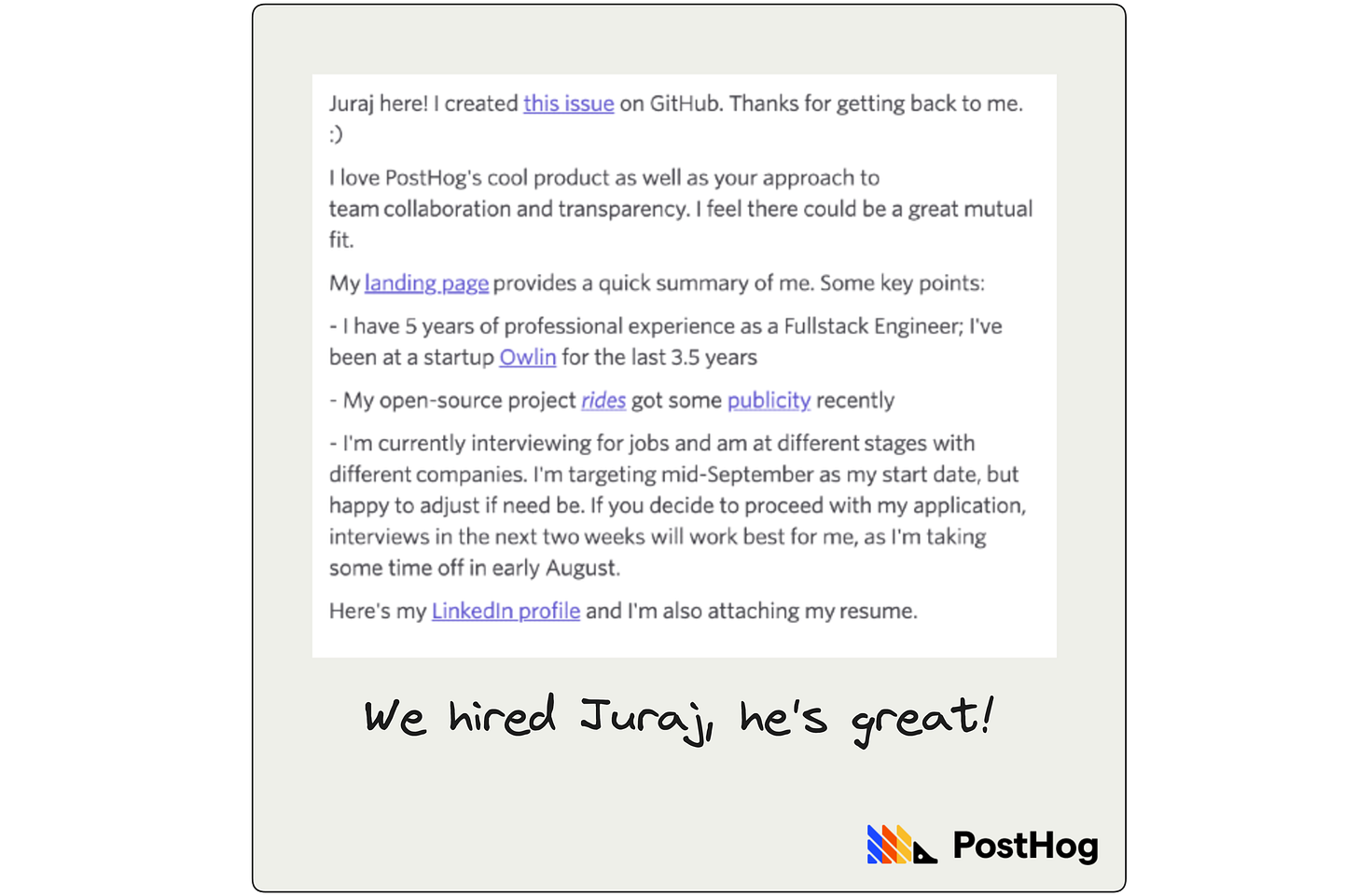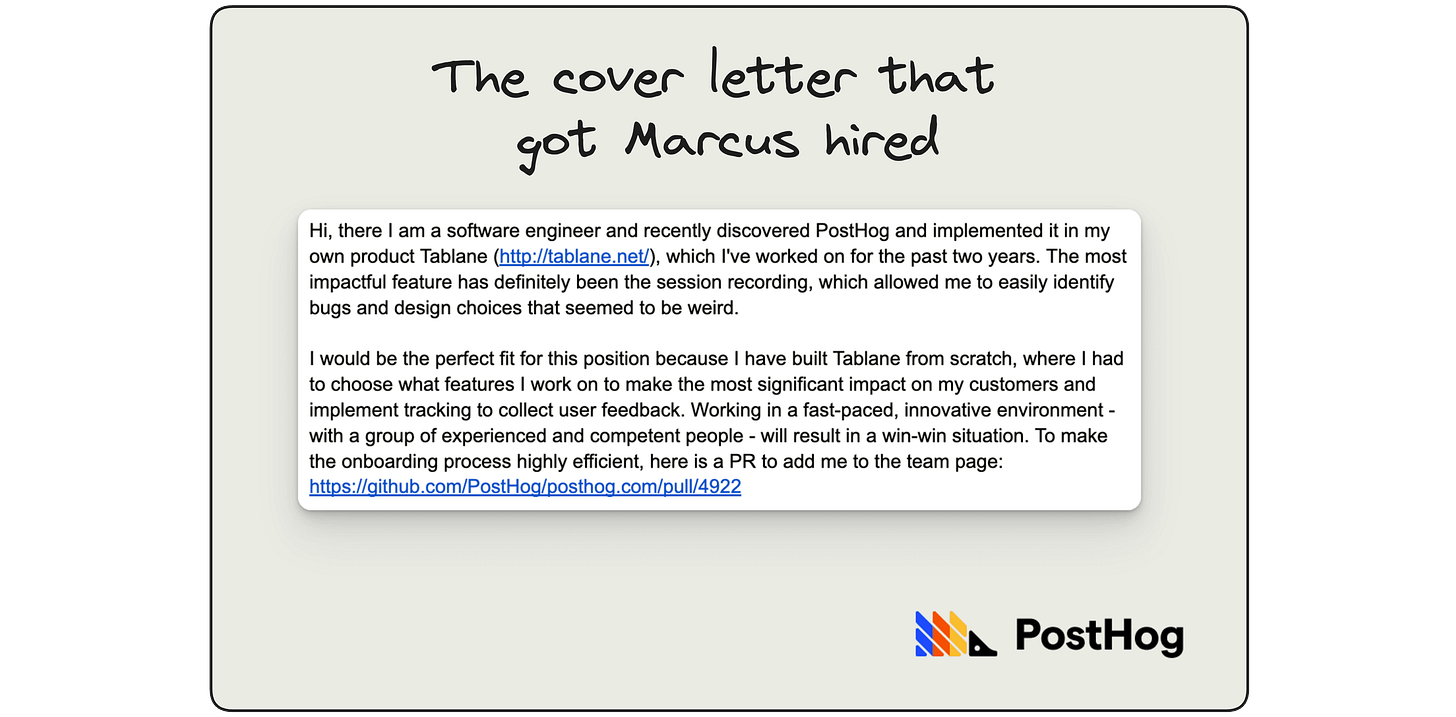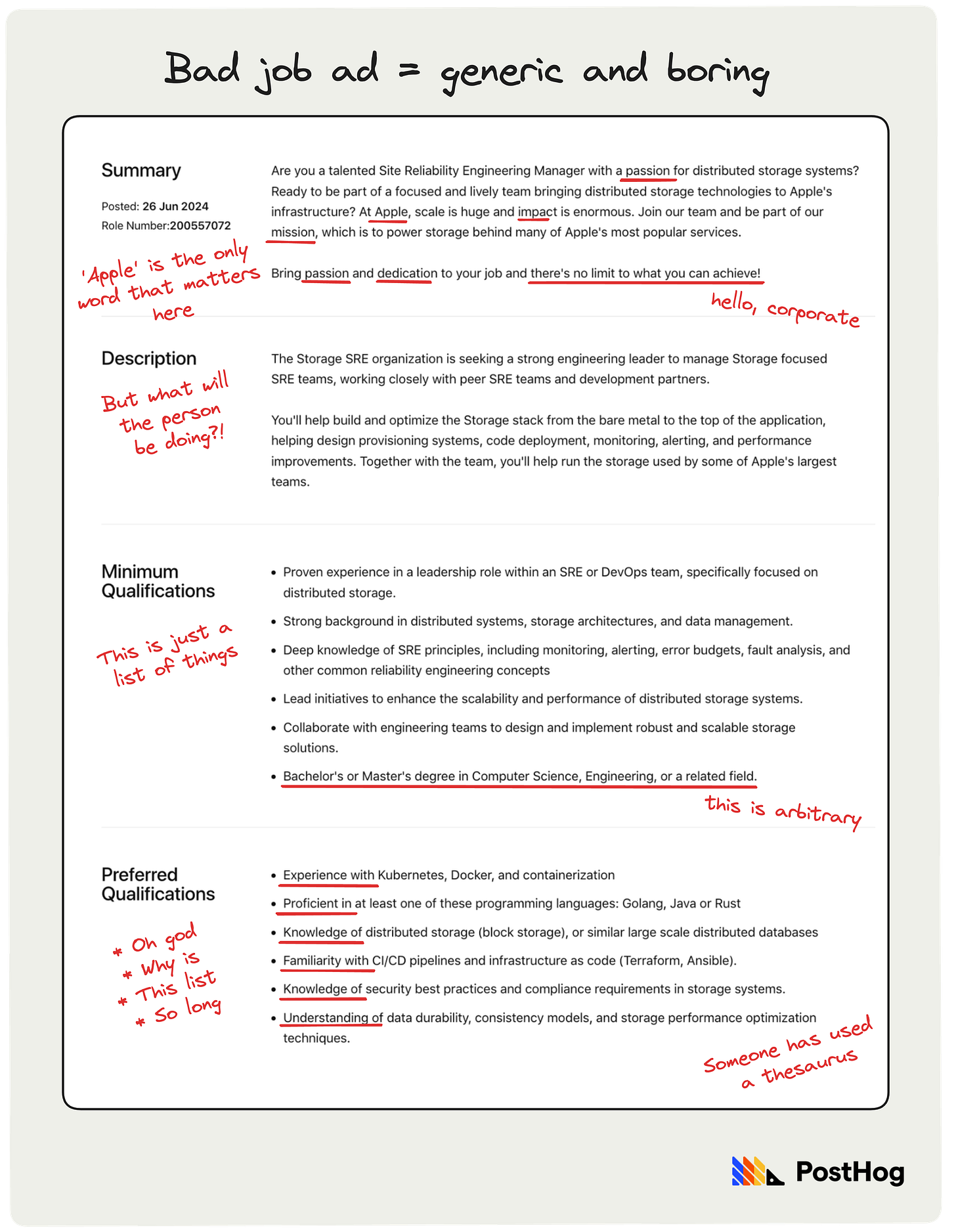How to get a job at a startup
Tips for breaking into the 0.4%
Welcome to Product for Engineers, a newsletter created by PostHog for engineers and founders who want to build successful startups.
In the last two months, we’ve had 900 people apply for engineering roles:
86 got a first interview
55 got a technical interview
10 did a SuperDay
4 were hired
That means we hired 0.4% of people who applied for engineering roles.
So, how do you join the 0.4% of superstar engineers – not just at PostHog, but at any other fast-growing startup?
1) Think like a recruiter
There’s a huge gap between what job applicants and recruiters experience.
With the exception of very early-stage companies, most startups will use an applicant tracking system like Ashby, Greenhouse, or Lever for hiring. We use Ashby.
They’re designed for speed, not to make you look good. This means you need to anticipate how your application will look inside this system, not as a finely-crafted PDF.
Brevity is your friend
A startup recruiter will, if you’re lucky, spend more than a few seconds reading your application. The easier you make it for them, the longer they’ll spend considering you.
Avoid any formatting that the application system is likely to remove. Keep it simple and low density. Black text, white background, no fancy graphics.
And please, no profile pictures.
We did the math and, on average, we spend less than one minute reviewing each application we receive. Automated or junk applications (hello, ChatGPT) are discarded in less than five seconds.
Truly great applications are read for up to five minutes.
Cover letter tips
Contrary to rumor, cover letters still matter, but they need to be short. Five to ten sentences is fine.
Don’t rewrite your resume, or start it with with ‘Dear Sir/Madam’. Never, ever, use ChatGPT. Not even to help you with a draft. We’ll know, it’s always obvious.
Strong cover letters we’ve received recently included the following:
An explanation of exactly why they want to join PostHog.
Style and language that reflected our company culture.
Examples of personal projects they’ve worked on with links.
Really clear info on what they’re looking for and their availability.
Something that made them stand out. Marcus, one of our support engineers, opened a PR to add him to the team page. Others have created PRs to update our docs, or raised useful product issues. When done well, we do notice these things.
One simple, annoying trick
Get ready to groan, but there’s one thing that will really help: a proper, warm referral. We trust our team’s judgment, so a referral can really help us pre-filter applicants.
How do you get a warm referral? Bombshell: be a great human1 and a great engineer. So good, in fact, that other human beings will attest to your greatness.
This doesn’t mean you should randomly spam people on LinkedIn for an intro (this never works), but it does mean you should work hard, attend hackathons (they’re great for networking), and leave a great impression wherever you go.
People talk to each other. And, who knows, one day maybe they’ll talk about you and be really nice.
Further reading: What recruiters actually see when you apply
2) Be genuinely curious
One way we’re able to recognize 10x engineers at the interview stage is by the questions they ask – not just the technical ones, though they’re important too.
It’s not rude to ask very specific questions, it shows you’re genuinely curious about what we’re doing. Here are some questions you should be asking when interviewing with a startup founder.
Does the company have product-market fit?
Very few engineers ask this when we do interviews. Ask! You can and should also ask about revenue, and the number of daily active users.
Early-stage startups might not have product-market fit, but they should have a plan for how to get there, and a clear picture what it will look like.
It’s a red flag if they can’t articulate this.
How much runway does the company have?
Or, simply put: is the company default alive?
A company with very little runway and no product-market fit is likely to have a challenging culture. Asking these kinds of questions will get you much closer to understanding what the company is like to work for than asking generic questions like “what’s it like to work here?”
Sure, a startup might not be profitable – but it should have a plan to be profitable before it runs out of money. If it doesn’t, ask why. Avoid companies that don’t know if they’re default alive or not, or don’t care about it.
If you could throw money at a problem and solve it immediately, what would it be?
Superstar engineers are laser-focused on working out where a company is struggling and how they can help.
Asking this question shows you want to understand a company’s biggest problems and are ready to throw yourself into solving them by shipping and shipping fast.
If you get the role, you need to be proactive in speaking to users, understanding problems big and small, taking ownership of them, and fixing them.
Further reading: The really important job interview questions engineers should ask (but don't)
3) Pick the right opportunity
It’s easier said than done, but good job ads are actually littered with clues.
Here’s what to look for:
Really tight requirements. A list of must-haves and a list of nice-to-haves. Each should be around four items long, that’s it.
A clear and simple hiring process. How many interviews are there? Is there a work trial? If so, what is it? And is it paid? If you know exactly what the hiring process is – and how long it takes – that’s a good sign.
Total salary transparency. This could be a range or it could be a tool that allows you to see an estimate of your potential salary. Either way, salary transparency is a must-have.
The job description is fun to read. No startup should be writing stodgy, corporate-esque job descriptions. This helps you better understand the company culture before you (hopefully) receive an offer.
Beyond that, research the company:
Are they attracting lots of (good) attention on social media?
Check Google Trends to see if there's growing interest in the company. This only works if the company has a unique brand name.
Use Crunchbase to dig into the company's investors and their track record.
Do the same for the founder or founders. Are they first-timers, or have they got previous exits? If they’re first-timers, what did they do before founding a startup?
This can help you find high-potential companies, and give you more context to shine during the interview stage.
4) Be cracked
We’ve written about this a lot in the past, but we’re obsessed with hiring cracked engineers, and have specific ideas as to what makes a 10x engineer.
For us ‘cracked’ means engineers who take extreme ownership of ideas, who are always optimistic, who make people feel excited and energized, are authentic, and who apply themselves to their craft.
There’s no single definition for this, but you should be able to define and articulate what makes you cracked.
5) Be available as soon as possible
This is a hard truth, but availability can make or break your chances.
Outside very senior or critical roles, many startups can’t wait for your three or six-month notice period to expire.
This is especially true of early-stage startups, where momentum is critical, but startups like ours that are scaling are a little more flexible.
Be honest about your availability up front. If you can, be available within weeks, not months.
Words by James Temperton, who doesn’t love to hate LinkedIn… he just hates it.
Good reads 📖
Why doesn't advice work? – Simple question, complex answer.
If AI chatbots are the future, I hate it – Wi-Fi and internet aren’t the same thing!
Should I open source my company? – Thoughts from the CTO of Supabase.
Time management techniques that actually work – via Lenny Rachitsky.
How to say "No" and win back your time as a software engineer – by Sidwyn Koh and Jordan Cutler.
Being a great human doesn’t necessarily mean being an effervescent personality. Being reliable and easy to work with is way less common than you might imagine. If you struggle getting referrals from former colleagues, be really honest about why that could be. More companies don’t have a culture of direct, honest feedback, which can obscure problems. It’s why we value trust and feedback so much.








This is great. Will include it in our Monday newsletter as it’s quite helpful to our job seeking audience
I recently hired for a junior-mid role. 210 CVs -> 1 hire. I didn't have any automatic tools, so I went over them by myself 😅
The tips here are golden. Every single one of the CVs and cover letters were boring and unoriginal. To get an interview, you have to stand out from the crowd some way.
Marcus's PR of adding himself to the team page is an absolutely amazing (and simple) idea to make someone laugh and get their attention.